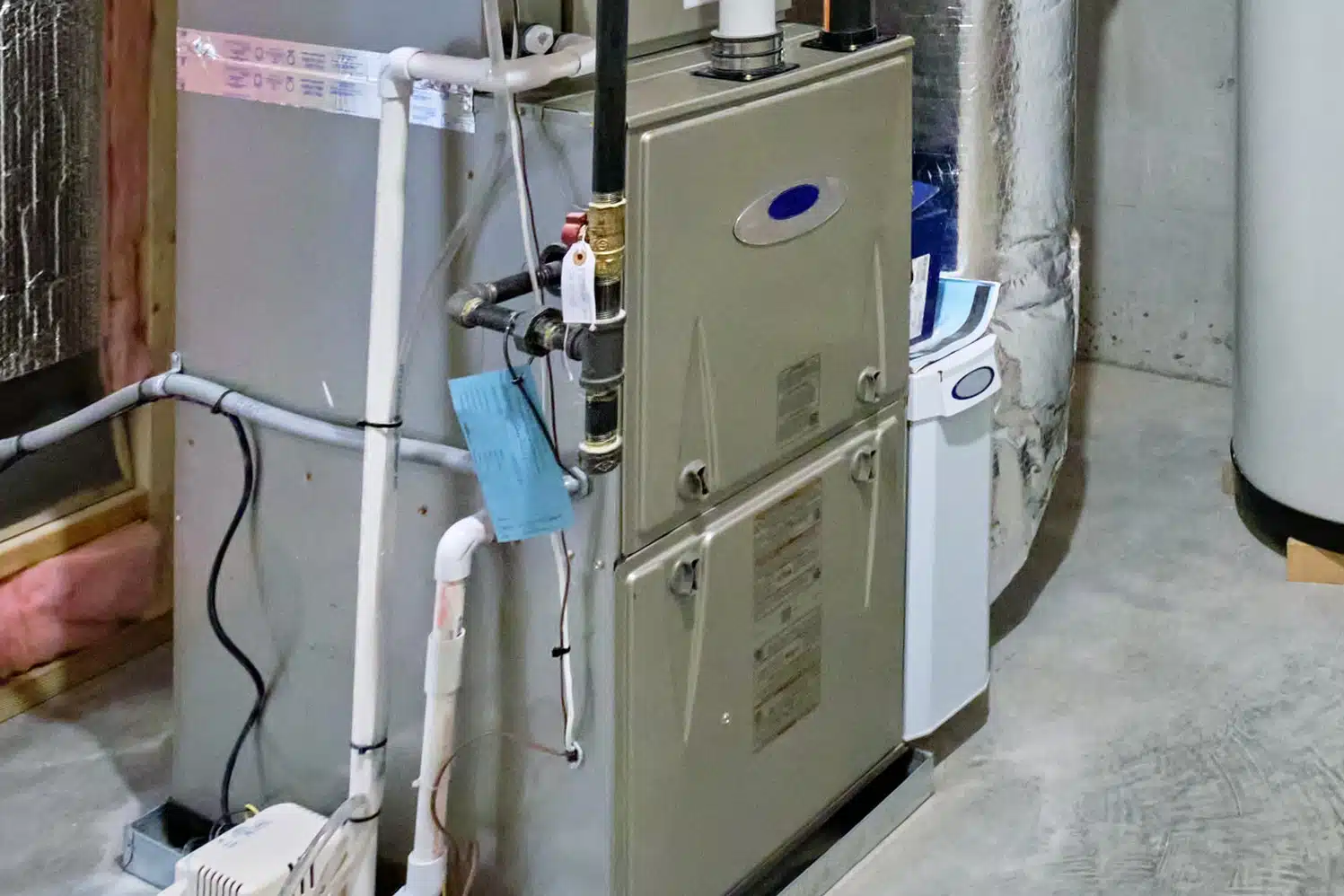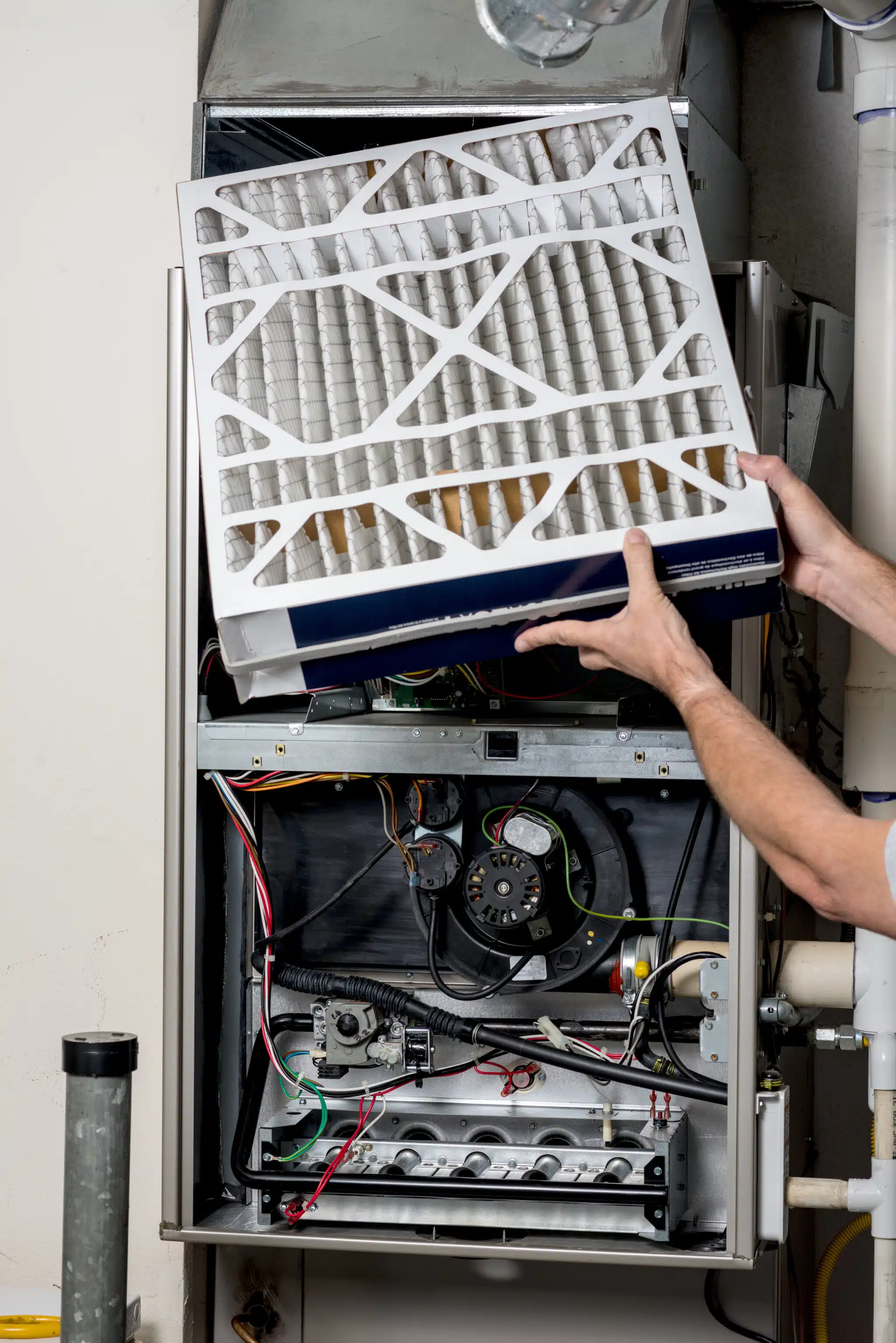Dual-fuel heating systems are redefining home heating by delivering unparalleled efficiency, flexibility, and savings. These advanced systems merge the cost-saving efficiency of heat pumps with the reliable power of gas furnaces. By automatically selecting the most energy-efficient fuel source based on the temperature, dual-fuel systems keep homes warm and energy bills low.
Homeowners in Doylestown, PA, are increasingly turning to dual-fuel heating systems for their ability to handle the area’s unpredictable winter weather. Whether it is a brisk December afternoon or a freezing night, these systems adapt effortlessly. For residents looking to reduce heating costs while staying cozy and environmentally conscious, dual-fuel systems are the future of home heating—combining innovation, comfort, and sustainability in one package.

What Is a Dual-Fuel Heating System?
Dual-fuel heating systems are a cutting-edge solution for homeowners seeking comfort and energy efficiency in every season. These systems combine the power of two heating technologies—a heat pump and a gas furnace—to deliver unparalleled performance. By intelligently switching between these components, they ensure your home remains warm while reducing energy usage.
The heat pump is the primary workhorse in mild and moderate cold weather. It uses electricity to extract heat from the outside air, even in chilly conditions, making it an energy-efficient choice. However, when the temperature drops too low for the heat pump to operate effectively, the gas furnace seamlessly takes over. This automatic transition ensures your home stays comfortable, no matter how severe the winter weather becomes.
What sets dual-fuel heating systems apart is their ability to optimize performance based on the temperature. During mild days, the heat pump minimizes energy costs. On freezing nights, the gas furnace provides the reliability needed to maintain warmth. Together, these components create a highly efficient system that adapts to your needs while keeping heating costs manageable.
For homeowners looking for an innovative heating solution, dual-fuel systems offer the perfect blend of efficiency, dependability, and comfort.
Energy Efficiency Advantages
Maximizing energy efficiency is at the heart of modern heating solutions, and hybrid systems excel at achieving this balance. These systems, which combine a heat pump with a gas furnace, adapt to outdoor conditions and ensure that energy is used wisely. By automatically switching between electricity and natural gas, they deliver reliable warmth with minimal waste.
Here are the top energy efficiency advantages:
-
Adaptive Energy Use
Hybrid systems are built to work smarter, not harder. During mild to moderately cold weather, the heat pump efficiently transfers heat from the outdoor air into your home using electricity. When temperatures drop below freezing, the gas furnace takes over seamlessly, ensuring consistent heating without excess energy use.
-
Reduced Energy Bills
One of the most noticeable benefits is the significant reduction in utility costs. By prioritizing the heat pump for milder temperatures and reserving the gas furnace for extreme cold, these systems optimize energy consumption. In regions like Doylestown, PA, where winters are unpredictable, homeowners often experience substantial savings.
-
Environmentally Friendly Operation
Hybrid systems are an excellent choice for those looking to reduce their carbon footprint. By relying on electricity for much of the heating season, they decrease the dependence on fossil fuels, helping to create a more sustainable future.
-
Eligibility for Incentives
Many dual-fuel heating systems qualify for energy efficiency tax credits and rebates, making the investment even more appealing. These financial benefits, combined with lower operating costs, add significant value over time.
-
Extended Equipment Lifespan
Alternating between the heat pump and the furnace reduces strain on both components, ensuring they last longer and operate efficiently. This not only minimizes repair costs but also enhances the overall reliability of your home’s heating system.
Hybrid systems combine innovation, adaptability, and efficiency, making them the ideal choice for energy-conscious homeowners. By optimizing energy use and reducing costs, they deliver comfort you can feel good about—both for your wallet and the planet.
Cost Savings Over Time
Choosing a dual-fuel heating system represents a smart investment in your home’s comfort and efficiency. While the initial cost may be higher than traditional systems, the long-term savings far outweigh the upfront expense. These systems are engineered to reduce energy waste, ensuring you only pay for the energy you truly need.
Balancing Upfront Costs with Future Savings
The higher initial investment of a dual-fuel heating system is offset by significant long-term reductions in energy bills. By relying on the heat pump for most of the season, these systems minimize the use of costly natural gas. Over time, the cumulative savings often exceed the upfront cost, making them a financially sound choice for homeowners.
Leveraging Incentives and Rebates
Many dual-fuel heating systems qualify for federal and state energy efficiency programs. These incentives, such as tax credits or rebates, help offset the initial installation cost, further enhancing the system’s affordability. Homeowners who take advantage of these programs can enjoy both immediate and long-term financial benefits.
Proven Real-World Savings
Homeowners who have upgraded to a dual-fuel system frequently report substantial reductions in their energy expenses. For instance, families in areas like Doylestown, PA, have experienced up to 30% savings on winter heating bills. These systems excel at adapting to fluctuating weather conditions, ensuring optimal performance and cost efficiency throughout the cold months.
By combining energy efficiency, adaptability, and access to financial incentives, dual-fuel heating systems deliver unparalleled value. They offer a long-term solution that reduces costs while providing consistent, eco-friendly comfort for your home.
Environmental Benefits
As the demand for sustainable living grows, homeowners are seeking heating solutions that balance comfort, efficiency, and environmental responsibility. Dual-fuel heating systems meet these needs by minimizing energy waste and reducing reliance on fossil fuels. By optimizing performance based on outdoor temperatures, these systems provide eco-friendly comfort without compromise.
Lower Carbon Emissions
Dual-fuel heating systems prioritize electricity through the heat pump during mild weather, significantly reducing fossil fuel usage. This shift results in fewer greenhouse gas emissions compared to traditional systems, directly contributing to a smaller carbon footprint. Over the course of a heating season, this reduction adds up to meaningful environmental benefits.
Efficient Energy Consumption
These systems ensure energy is used efficiently by alternating between the heat pump and gas furnace. The heat pump draws energy from renewable electricity sources, while the gas furnace provides reliable backup during extreme cold. This balance conserves energy and reduces waste.
Alignment with Renewable Energy Goals
Dual-fuel heating systems are compatible with renewable energy initiatives, such as solar panels or wind energy. By using electricity generated from renewables, these systems further decrease reliance on nonrenewable energy sources and align with green living goals.
Decreased Environmental Waste
The longevity of dual-fuel heating systems means fewer replacements and less equipment ending up in landfills. The efficient operation also minimizes maintenance needs, reducing the environmental impact associated with the production and disposal of HVAC components.
Improved Air Quality
By reducing dependence on fossil fuels, dual-fuel systems help decrease harmful emissions that contribute to air pollution. Cleaner air not only benefits the planet but also enhances the health of your family and community.
Merging intelligent design with sustainability, dual-fuel heating systems provide an effective solution for reducing your home’s environmental impact. They are a forward-thinking investment for homeowners aiming to enjoy modern comfort while supporting a cleaner, greener future.
Enhanced Comfort and Versatility
Heating systems should do more than just warm your home—they should enhance your living experience. Dual-fuel heating systems excel at this by delivering unmatched comfort and remarkable versatility. Their innovative design, which combines a heat pump and a gas furnace, ensures consistent warmth and effortless adaptability to changing conditions.
Effortless Temperature Consistency
With dual-fuel heating systems, you will experience steady indoor temperatures without sudden fluctuations. The heat pump takes the lead during milder conditions, providing efficient heating without overuse of energy. When freezing temperatures strike, the gas furnace activates seamlessly, ensuring your home remains warm and cozy, even in the harshest weather.
Adaptable to Any Climate
Dual-fuel systems are ideal for regions with varying climates, such as Doylestown, PA. They adjust dynamically to fluctuating weather, offering reliable performance whether it is a crisp December afternoon or a bone-chilling winter night. This adaptability ensures your home stays comfortable no matter how unpredictable the seasons become.
Whisper-Quiet Operation
Say goodbye to the intrusive hum of traditional heating systems. Dual-fuel systems operate quietly, allowing you to enjoy uninterrupted comfort without noise disruptions. Their advanced technology ensures efficient performance that you will hardly notice, except for the cozy warmth they provide.
Customized for Your Home
Every home is unique, and dual-fuel heating systems are designed to meet individual needs. HVAC professionals can tailor the system to match your home’s specific size, layout, and energy requirements. This customization ensures maximum comfort and efficiency, regardless of your home’s design.
Dual-fuel heating systems redefine the meaning of home comfort by combining intelligent technology with superior versatility. Their ability to adapt seamlessly to your needs makes them a forward-thinking investment for anyone looking to enhance their home’s heating experience.
Ideal Climates for Dual-Fuel Systems
Dual-fuel heating systems are designed to adapt to a range of weather conditions, making them a perfect choice for climates with fluctuating temperatures. By seamlessly switching between a heat pump and a gas furnace, these systems provide efficient, reliable heating regardless of the season.
Regions with Mild to Cold Winters
Homes in areas with moderate winters benefit the most from dual-fuel heating systems. The heat pump handles heating during mild days, efficiently transferring warmth from the air without heavy energy use. When temperatures drop below freezing, the gas furnace activates, ensuring warmth without overburdening the system.
Areas with Unpredictable Weather
In regions where winter temperatures swing between mild and severe, dual-fuel systems thrive. Their ability to adjust between energy sources ensures consistent performance. For example, homeowners in Doylestown, PA, experience varying weather during winter months, making dual-fuel systems an ideal solution for adapting to unpredictable conditions.
Eco-Conscious Communities
Dual-fuel systems are especially beneficial in areas with a focus on sustainability. Their use of electricity during moderate temperatures reduces reliance on fossil fuels, cutting greenhouse gas emissions and aligning with green living initiatives. This makes them a top choice for homeowners who prioritize environmental responsibility.
Transitional Zones
Regions where seasonal changes are pronounced, such as those between warmer southern climates and colder northern areas, are a perfect fit for dual-fuel systems. These systems provide efficient heating through the shoulder seasons, switching seamlessly when harsher winter conditions arrive.
By offering adaptability, efficiency, and reliability, dual-fuel heating systems are tailored to meet the needs of diverse climates. Their ability to maintain comfort while reducing energy consumption makes them a superior choice for homeowners in variable weather regions.
Installation Considerations
Installing a dual-fuel heating system is a crucial step toward achieving efficient and reliable home heating. However, the success of your system depends heavily on proper installation and a customized approach tailored to your home’s unique needs. By working with skilled professionals, homeowners can ensure their system is set up to deliver optimal performance for years to come.
Comprehensive Installation Process
Installing dual-fuel heating systems begins with a detailed home assessment. HVAC professionals evaluate factors such as square footage, insulation quality, and the existing ductwork to determine the best configuration. Once the heat pump and gas furnace are selected, the technician installs both components, ensuring they work together seamlessly. The final step involves testing and calibrating the system to ensure smooth operation and reliable fuel switching.
The Importance of Proper Sizing
Accurate sizing is critical for dual-fuel systems to function effectively. If the system is too small, it will struggle to heat your home during extreme cold. Conversely, an oversized system can result in inefficient cycling, increasing wear and energy costs. Professional sizing calculations take into account your home’s heat loss and specific climate needs, ensuring the system operates at peak efficiency.
Specific Considerations for Doylestown Homes
Doylestown’s winters range from mild to freezing, making it essential to choose a system capable of adapting to fluctuating conditions. For older homes in the area, updates to ductwork or electrical panels may be necessary to support the dual-fuel system. Additionally, ensuring proper insulation can enhance the system’s performance, maximizing comfort and energy savings.
The Value of Expert Installation
Proper installation by licensed professionals ensures every component is configured correctly, preventing issues that could compromise efficiency or durability. Their expertise guarantees the system will operate as intended, delivering both reliability and energy savings.
A dual-fuel heating system is a long-term investment that delivers unparalleled comfort and efficiency. By choosing professional installation and addressing your home’s specific needs, you can enjoy the full benefits of this innovative technology.

Maintenance and Longevity
Dual-Fuel Heating Systems are a long-term investment in comfort and energy efficiency, but like any advanced technology, they require regular care to perform at their best. With proper maintenance and professional oversight, these systems can deliver reliable heating for decades, ensuring consistent warmth and lower energy costs.
Key Maintenance Requirements
Dual-Fuel Heating Systems combine the precision of a heat pump with the dependability of a gas furnace, and each requires attention to specific areas. Filters must be replaced regularly to maintain airflow and protect internal components from unnecessary strain. The outdoor heat pump unit should remain free of debris, such as leaves and dirt, to ensure uninterrupted performance. Periodic inspections of the gas furnace, including burners and ignition systems, are essential to keep it running safely and efficiently.
Simple Steps to Extend Lifespan
Homeowners can adopt straightforward habits to ensure their systems last longer:
- Keep the area around the heat pump clear to prevent obstructions.
- Adjust thermostats moderately to reduce system strain during extreme weather.
- Replace filters every 1-3 months based on usage and air quality conditions.
- Watch for warning signs like unusual noises, fluctuating performance, or spikes in energy bills, and address them promptly.
These proactive measures prevent costly damage and maintain the system’s reliability.
The Value of Professional Servicing
Annual servicing is critical to the long-term performance of Dual-Fuel Heating Systems. Skilled HVAC professionals perform detailed inspections, clean essential components, and fine-tune system settings. Their expertise ensures that both the heat pump and gas furnace work in harmony, maximizing efficiency and preventing breakdowns. Regular servicing also provides peace of mind, knowing that your system is ready for any weather challenge.
By combining regular homeowner care with expert servicing, Dual-Fuel Heating Systems offer unmatched durability and efficiency. Investing in maintenance today ensures consistent comfort, lower costs, and a heating system that stands the test of time.
FAQS About Dual-Fuel Heating Systems
-
How does a dual-fuel system decide which fuel source to use?
The system automatically evaluates the outdoor temperature. It uses the heat pump during mild conditions for efficiency and switches to the gas furnace when temperatures drop significantly, ensuring reliable heating.
-
Are dual-fuel systems more expensive to install than traditional systems?
While the upfront cost is higher, dual-fuel systems deliver significant energy savings over time, often qualifying for energy efficiency rebates and tax credits.
-
Can I integrate a dual-fuel system with my existing HVAC setup?
in many cases, dual-fuel systems can be adapted to your current HVAC configuration, provided the ductwork and electrical systems are compatible.
-
What kind of maintenance do these systems require?
Regular tasks include changing air filters, keeping the heat pump clear of debris, and scheduling annual professional servicing to ensure peak efficiency.
-
How long can I expect a dual-fuel heating system to last?
With consistent maintenance, Dual-Fuel Heating Systems typically last 15-20 years, offering reliable performance and excellent energy efficiency throughout their lifespan.
Dual-fuel heating Systems combine advanced technology with energy efficiency, delivering consistent comfort and significant savings for your home. Their adaptability to varying temperatures ensures you are always prepared, no matter the season. Choosing a dual-fuel system is an investment in both comfort and sustainability.
At One Hour Heating & Air Conditioning of Lancaster, PA, our team provides expert guidance, installation, and maintenance to ensure your system performs flawlessly. Ready to experience the benefits? Contact us today to learn how Dual-Fuel Heating Systems can transform your home’s comfort and efficiency!





